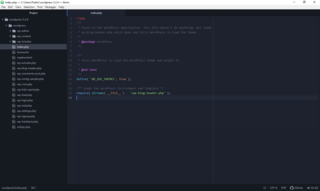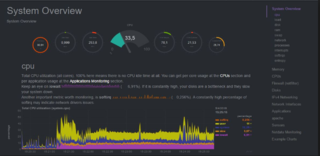
Markdown is a lightweight markup language for creating formatted text using a plain-text editor. John Gruber created Markdown in 2004, in collaboration with Aaron Swartz, as a markup language that is intended to be easy to read in its source code form. Markdown is widely used for blogging and instant messaging, and also used elsewhere in online forums, collaborative software, documentation pages, and readme files.
OpenGrok is a source code cross-reference and search engine. It helps programmers search, cross-reference, and navigate source code trees to aid program comprehension.
The following tables list notable software packages that are nominal IDEs; standalone tools such as source-code editors and GUI builders are not included. These IDEs are listed in alphabetic order of the supported language.
Google Code Search was a free beta product from Google which debuted in Google Labs on October 5, 2006, allowing web users to search for open-source code on the Internet. Features included the ability to search using operators, namely lang:, package:, license:, and file:.
Azure DevOps Server, formerly known as Team Foundation Server (TFS) and Visual Studio Team System (VSTS), is a Microsoft product that provides version control, reporting, requirements management, project management, automated builds, testing and release management capabilities. It covers the entire application lifecycle and enables DevOps capabilities. Azure DevOps can be used as a back-end to numerous integrated development environments (IDEs) but is tailored for Microsoft Visual Studio and Eclipse on all platforms.
In FOSS development communities, a forge is a web-based collaborative software platform for both developing and sharing computer applications.

GitHub is a developer platform that allows developers to create, store, manage and share their code. It uses Git software, providing the distributed version control of Git plus access control, bug tracking, software feature requests, task management, continuous integration, and wikis for every project. Headquartered in California, it has been a subsidiary of Microsoft since 2018.
Coccinelle is an open-source utility for matching and transforming the source code of programs written in the C programming language.

Opa is an open-source programming language for developing scalable web applications.

OpenShift is a family of containerization software products developed by Red Hat. Its flagship product is the OpenShift Container Platform — a hybrid cloud platform as a service built around Linux containers orchestrated and managed by Kubernetes on a foundation of Red Hat Enterprise Linux. The family's other products provide this platform through different environments: OKD serves as the community-driven upstream, Several deployment methods are available including self-managed, cloud native under ROSA, ARO and RHOIC on AWS, Azure, and IBM Cloud respectively, OpenShift Online as software as a service, and OpenShift Dedicated as a managed service.

Vagrant is a source-available software product for building and maintaining portable virtual software development environments; e.g., for VirtualBox, KVM, Hyper-V, Docker containers, VMware, Parallels, and AWS. It tries to simplify the software configuration management of virtualization in order to increase development productivity. Vagrant is written in the Ruby language, but its ecosystem supports development in a few other languages.

Travis CI is a hosted continuous integration service used to build and test software projects hosted on GitHub, Bitbucket, GitLab, Perforce, Apache Subversion and Assembla.

The Windows Package Manager is a free and open-source package manager designed by Microsoft for Windows 10 and Windows 11. It consists of a command-line utility and a set of services for installing applications. Independent software vendors can use it as a distribution channel for their software packages.
Docker is a set of platform as a service (PaaS) products that use OS-level virtualization to deliver software in packages called containers. The service has both free and premium tiers. The software that hosts the containers is called Docker Engine. It was first released in 2013 and is developed by Docker, Inc.

Atom is a free and open-source text and source-code editor for macOS, Linux, and Windows with support for plug-ins written in JavaScript, and embedded Git control. Developed by GitHub, Atom was released on June 25, 2015.

Visual Studio Code, also commonly referred to as VS Code, is a source-code editor developed by Microsoft for Windows, Linux, macOS and web browsers. Features include support for debugging, syntax highlighting, intelligent code completion, snippets, code refactoring, and embedded version control with Git. Users can change the theme, keyboard shortcuts, preferences, and install extensions that add functionality.

Eclipse Che is an open-source, Java-based developer workspace server and online IDE. It includes a multi-user remote development platform. The workspace server comes with a flexible RESTful webservice. It also contains a SDK for creating plug-ins for languages, frameworks or tools. Eclipse Che is an Eclipse Cloud Development (ECD) top-level project, allowing contributions from the user community.
Sourcegraph Inc. is a company developing code search and code intelligence tool that semantically indexes and analyzes large codebases so that they can be searched across commercial, open-source, local, and cloud-based repositories.

With Netdata Users can monitor their servers, containers, and applications,in high-resolution and in real-time. Netdata is an open source tool designed to collect real-time metrics, such as CPU usage, disk activity, bandwidth usage, website visits, etc., and then display them in low-latency dashboards. The tool is designed to visualize activity in the greatest possible detail, allowing the user to obtain an overview of what is happening and what has just happened in their system or application.










